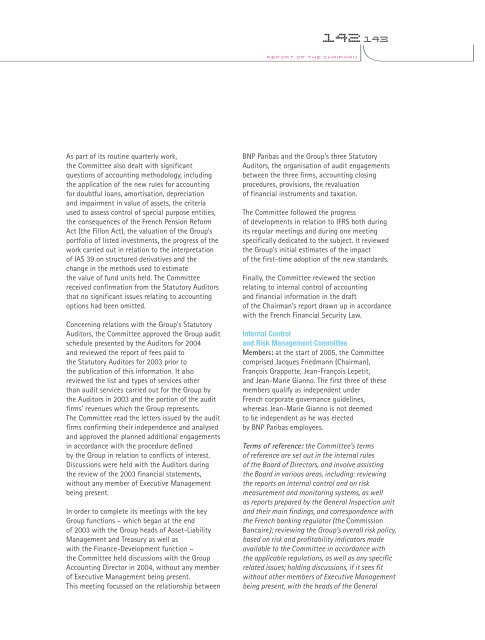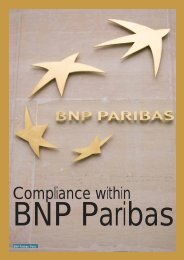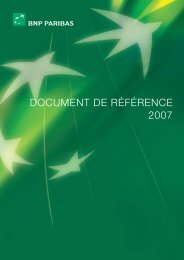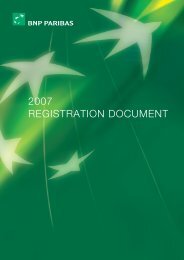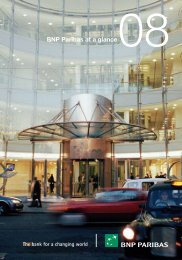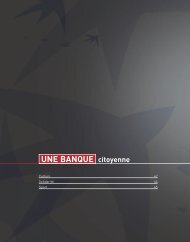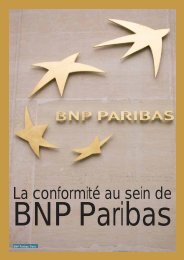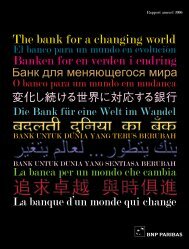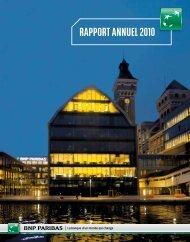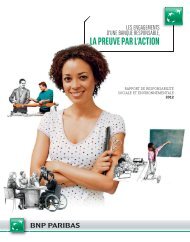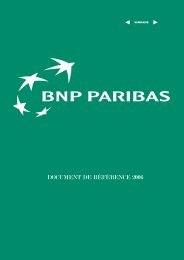La banque d'un monde qui change 2004 - BNP Paribas
La banque d'un monde qui change 2004 - BNP Paribas
La banque d'un monde qui change 2004 - BNP Paribas
Create successful ePaper yourself
Turn your PDF publications into a flip-book with our unique Google optimized e-Paper software.
142report of the chairman143As part of its routine quarterly work,the Committee also dealt with significantquestions of accounting methodology, includingthe application of the new rules for accountingfor doubtful loans, amortisation, depreciationand impairment in value of assets, the criteriaused to assess control of special purpose entities,the consequences of the French Pension ReformAct (the Fillon Act), the valuation of the Group’sportfolio of listed investments, the progress of thework carried out in relation to the interpretationof IAS 39 on structured derivatives and the<strong>change</strong> in the methods used to estimatethe value of fund units held. The Committeereceived confirmation from the Statutory Auditorsthat no significant issues relating to accountingoptions had been omitted.Concerning relations with the Group’s StatutoryAuditors, the Committee approved the Group auditschedule presented by the Auditors for <strong>2004</strong>and reviewed the report of fees paid tothe Statutory Auditors for 2003 prior tothe publication of this information. It alsoreviewed the list and types of services otherthan audit services carried out for the Group bythe Auditors in 2003 and the portion of the auditfirms’ revenues which the Group represents.The Committee read the letters issued by the auditfirms confirming their independence and analysedand approved the planned additional engagementsin accordance with the procedure definedby the Group in relation to conflicts of interest.Discussions were held with the Auditors duringthe review of the 2003 financial statements,without any member of Executive Managementbeing present.In order to complete its meetings with the keyGroup functions – which began at the endof 2003 with the Group heads of Asset-LiabilityManagement and Treasury as well aswith the Finance-Development function –the Committee held discussions with the GroupAccounting Director in <strong>2004</strong>, without any memberof Executive Management being present.This meeting focussed on the relationship between<strong>BNP</strong> <strong>Paribas</strong> and the Group’s three StatutoryAuditors, the organisation of audit engagementsbetween the three firms, accounting closingprocedures, provisions, the revaluationof financial instruments and taxation.The Committee followed the progressof developments in relation to IFRS both duringits regular meetings and during one meetingspecifically dedicated to the subject. It reviewedthe Group’s initial estimates of the impactof the first-time adoption of the new standards.Finally, the Committee reviewed the sectionrelating to internal control of accountingand financial information in the draftof the Chairman’s report drawn up in accordancewith the French Financial Security <strong>La</strong>w.Internal Controland Risk Management CommitteeMembers: at the start of 2005, the Committeecomprised Jacques Friedmann (Chairman),François Grappotte, Jean-François Lepetit,and Jean-Marie Gianno. The first three of thesemembers qualify as independent underFrench corporate governance guidelines,whereas Jean-Marie Gianno is not deemedto be independent as he was electedby <strong>BNP</strong> <strong>Paribas</strong> employees.Terms of reference: the Committee’s termsof reference are set out in the internal rulesof the Board of Directors, and involve assistingthe Board in various areas, including: reviewingthe reports on internal control and on riskmeasurement and monitoring systems, as wellas reports prepared by the General Inspection unitand their main findings, and correspondence withthe French banking regulator (the CommissionBancaire); reviewing the Group’s overall risk policy,based on risk and profitability indicators madeavailable to the Committee in accordance withthe applicable regulations, as well as any specificrelated issues; holding discussions, if it sees fitwithout other members of Executive Managementbeing present, with the heads of the General


